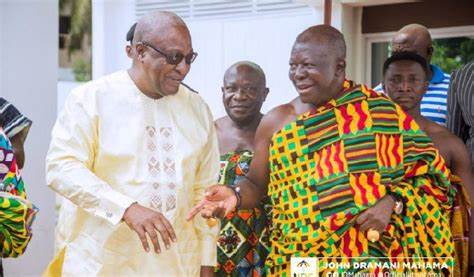The impending meeting between President John Dramani Mahama and the Asantehene, Otumfuo Osei Tutu II, scheduled for Sunday, January 19, 2025, carries significant weight as it aims to address the escalating tensions and violence plaguing the Bawku and Walewale regions of Ghana. These areas, located in the Upper East and Northern regions respectively, have been grappling with escalating chieftaincy disputes, leading to a tragic loss of life and widespread destruction of property. The announcement of this crucial meeting followed President Mahama’s visit to the Nayiri Palace, where he engaged in discussions with Naa Bohagu Mahami Abdulai Sheriga II, the King and Overlord of the Mamprugu Kingdom. This visit underscored the President’s deep concern over the deteriorating security situation and his commitment to seeking a peaceful resolution to the conflict.
President Mahama’s decision to involve the Asantehene highlights the gravity of the situation and the recognized influence of the Asantehene as a respected mediator and peacemaker. The Asantehene, Otumfuo Osei Tutu II, holds a position of immense authority and reverence within Ghana, and his wisdom and experience in conflict resolution are highly regarded. Having successfully mediated similar disputes in the past, the Asantehene’s involvement offers a glimmer of hope for a breakthrough in the Bawku and Walewale crises. The President expressed confidence that the meeting would serve as a pivotal moment in charting a path towards sustainable peace and stability in these troubled regions.
The underlying cause of the conflict in both Bawku and Walewale stems from long-standing chieftaincy disputes between different ethnic factions vying for power and control. These disputes have deep historical roots and are often intertwined with issues of land ownership, resource allocation, and political influence. Over time, these tensions have escalated into violent clashes, resulting in the displacement of communities, the disruption of livelihoods, and a pervasive sense of fear and insecurity among residents. The protracted nature of these conflicts has not only caused immense suffering for the affected populations but also poses a significant threat to the overall stability and development of the regions.
The President’s visit to the Nayiri Palace, before his meeting with the Asantehene, emphasizes the importance of engaging with all key stakeholders in the peace process. The Nayiri, as the Overlord of the Mamprugu Kingdom, holds considerable sway within the Northern region and his support is crucial for any peace initiative to succeed. By consulting with the Nayiri, President Mahama demonstrates his commitment to inclusive dialogue and his recognition of the traditional authorities’ role in resolving local conflicts. This engagement also signals the President’s intention to build a broad-based consensus around the peace process, ensuring its legitimacy and long-term sustainability.
The anticipated outcome of the meeting between President Mahama and the Asantehene is the formulation of a roadmap towards lasting peace in Bawku and Walewale. This roadmap will likely involve a multi-faceted approach, addressing the root causes of the conflict, fostering dialogue and reconciliation between the warring factions, and strengthening security measures to prevent further violence. The Asantehene’s experience in mediating complex disputes will be invaluable in this process, as he can leverage his influence to bring the conflicting parties to the negotiating table and facilitate a mutually acceptable solution. The success of this meeting, however, will depend not only on the wisdom and leadership of the Asantehene but also on the willingness of the warring factions to embrace dialogue and compromise.
Ultimately, the quest for peace in Bawku and Walewale requires a collective effort. While the Asantehene’s mediation efforts are crucial, sustainable peace can only be achieved through the active participation of all stakeholders, including the local communities, traditional leaders, political actors, and civil society organizations. It is essential to address the underlying grievances that fuel the conflict, promote inter-communal dialogue and understanding, and empower local communities to take ownership of the peace process. Furthermore, the government must strengthen its security apparatus to ensure the safety and protection of all citizens, while also promoting development initiatives that address the socio-economic factors contributing to the conflict. The meeting between President Mahama and the Asantehene represents a significant step forward, but it is only the beginning of a long and challenging journey towards lasting peace.














